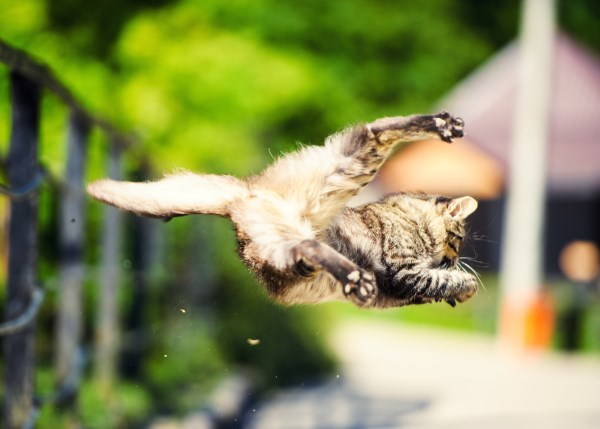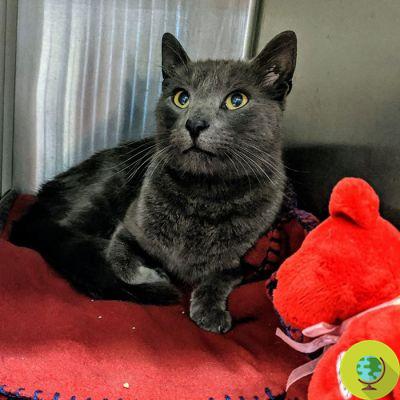Do cats always fall on their feet and are they great traitors? Here are the truths about cats you don't know.
They would fall to their feet, they would be treacherous, they could not be near pregnant women, and they would especially love to drink milk. About cats, we know, they are told galore and not only that - probably - they would have seven lives.
We could count several myths about our feline friends. Thanks to some specialists in animal behavior, it is understood that the true nature of cats goes far beyond what you think you know.
What seems certain is that cats are animals that love their independence, but even on this point there are several legends to dispel, as well as the most common false myths ...
So here are 10 things you thought you knew about cats, but they aren't quite like that
Index
Do cats always fall on their feet?

No, cats don't always fall to their feet, but it depends on how high they fall. If the cat has time to roll on itself, it will land on its feet, otherwise - if the height of the fall is not very high - they do not have time to do so and could fall with the body.
The kitten develops this ability only after 40 days. It is an instinctive behavior, but it needs a part of learning “.
Do cats love milk?

False. Cats do not have lactase, the enzyme responsible for the digestion of sugar characteristic of milk. This enzyme is present in infants but disappears after weaning. Therefore, giving milk to an adult cat can cause gastrointestinal problems. Cats are carnivorous animals.
The cat cannot be near a pregnant woman

False. Or rather not quite true. Toxoplasmosis is a disease caused by an intracellular parasite: Toxoplasma gondii. The disease is very rare in cats, and some studies have shown the low probability of infection from the feces of an infected cat. But in rare cases, however, the infection would occur with direct contact with the infected feces and not with the cat itself. Recall, however, that transmission is more frequent through poorly washed fruit or vegetables, undercooked meat or contaminated soils. For more info read here
If the cat loses its whiskers, does it lose its balance?

True. The vibrisse they are tactile hairs located in the facial area. They are thicker and longer than normal hair and their peculiarity is that they are internally connected with a voluntary control muscle and nerve receptors. In this way, cats are able to detect small variations in air currents from nearby objects. They are very important in their orientation, along with the rest of the senses. Balance in cats is a complex system formed by the muscular, tactile and visual systems. If the cat loses its whiskers it will have to rely much more on its other senses.
Is the cat treacherous and unfaithful?

No, betrayal has nothing to do with a cat's behavior or demands. The cat is rather a solitary, shy and untrustworthy animal, even if you meet cats with a more marked sociability. In order to survive, the cat does not need to be in society, that is, in an organized group, like the dog. But he is equally capable of giving so much affection to those who love him.
Does the cat get fat if neutered?

Although the animal's metabolism changes with castration, obesity is not an inevitable consequence of it: once the cat's body is settled, if the food is adequate and plays enough, it does not mean that it will gain so much weight.
Cats don't get along well with dogs
 Credit: Enzo Di Bitonto
Credit: Enzo Di Bitonto
If they lived together during their socialization period, they will identify dogs as a known and friendly species. What is certain is that a cat running in front of a dog will activate his hunting behavior, with the consequent chase.
Are they dangerous for children?

They are neither more nor less dangerous than any other pet. To be with a child, we must have made sure that this pet has socialized with babies and children of different ages. However, what many advise is not to leave the cat alone with the child and to be careful of the cat's hunting behavior, which is activated when there are things that move in front of him, such as the child's hands and feet. .
Can they be trained?

Obviously they can be trained, the problem we have is their "permanence" when we are going to dedicate ourselves to training. A dog, thanks to his sociable nature, will be with us whenever we pay attention to him. The cat's solitary behavior, on the other hand, will make things a little more complicated for us.
Do they see in the dark?

Yes, they see in the dark. Cats are "crepuscular" hunters. They are able to adapt to extreme light conditions and lack of it. Cats see up to 6 times better than humans at night, thanks to the anatomy and physiology of the retina. Of course, in the total absence of light they do not see, but they are able to guide and hunt through their whiskers and their sense of hearing.
Read also:
- Cats, so weird, so adorable! 10 curiosities to discover
- Cats talk too: that's what they want to tell us with purring and meowing
- Why do cats love boxes so much?
- 10 ideas for a cat and dog-friendly home
Germana Carillo


























